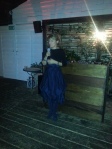Event: The book launch of Sally Green’s novel ‘Half Bad’ (part of a trilogy
Who: Penguin Publishers, FMcM & Sally Green
When: Tuesday 19th November 2013.
Where: The edgy, cool ‘Secret Garden Bar’ in the private members club of Shoreditch House, Shoreditch (naturally)
Refreshments: To kick of the evening me and my plus one were invited to drink the ‘Half Bad’ cocktail which was made up of lemon vodka, cointreau, lemon & cranberry juice – it wasn’t half-bad ahmmm then after a couple of these it was on to the white wine
The canapés were delicious (with the exception of the pork terrine that was a really weird texture, a bit like chewing on some undercooked meat fat), I enjoyed sampling mini scotch eggs, aubergine pizza, lobster and avocado tartlet and crab crostini, yummy!
Review:
The Book: In modern-day England, witches live alongside humans both good, evil and Nathan, who is both. Nathan’s father is the world’s most powerful and cruel of the witches and his mother is dead. Hunted by everyone, Nathan must escape before he turns 17 years old at which point he will receive three gifts from his father and come into his own as a witch—or else he will die. But how can Nathan find his father when there is no one safe to trust—not even family, not even the girl he loves?
After walking around Ebor Street for the best part of 10minutes, it should be noted that Ebor Street is very short so this was a fair few laps, I finally followed the small crowd to the entrance of Shoreditch House – seriously Shoreditch sometimes it’s kinder on the casual east-end tourist to indulge in a sign or two. Straight to the 6th floor my companion and I shot, with a small glimpse of floor 4 & 5 on the way up (gym and private members bar for £700 thank you very much), past the outdoor swimming pool and into the secret garden bar where we were met by the Half Bad party and a male model, in a cage, naturally.
Having not read the book, I was informed by the author herself that it was incredibly symbolic and central to the story. Nathan (the model inside) is placed in a cage for two years by the white witches in the community until they can decide his fate – his Dad’s the baddest of the black witches hence they don’t trust his true nature
Amongst the canapés and cocktails we had a speech from the author, who quite frankly came across as extremely humble and also very inspiring. Having started her professional career in accountancy then moving on to motherhood (children and chickens) she had become rather bored of her routine. One day to battle the boredom she began writing. An afternoon hobby that soon turned to obsession and a very very long novel. Considering herself an amateur she enrolled in a creative writing course and proceeded to edit and evolve her story into a professional manuscript. Being exceptionally character driven in her style the story remained consistent but a lot more concise.
After receiving a host of rejections, it was finally purchased by Puffin & Viking in the USA, this triggered a snowball effect as agents and publishers caught on to her unique voice. And although her book has not yet been officially released the rights have already been bought by 20th Century Fox and will be produced by the brains behind the twilight film franchise
Finishing her speech, shouting due to a small microphone malfunction, she likened her whole experience to winning the lottery, you play the game but you never really expect to win.
The evening was rounded off with, more wine, and an invitation into Nathan’s cage to receive a copy of Half Bad, this was sightly disconcerting as he wouldn’t speak so I ended up grabbing the book mumbling ‘sorry you’re in a cage’ before hot footing it out of there and off to get it signed by the lovely Sally.
All in all, a very delightful evening.
Rating: 8 out of 10





